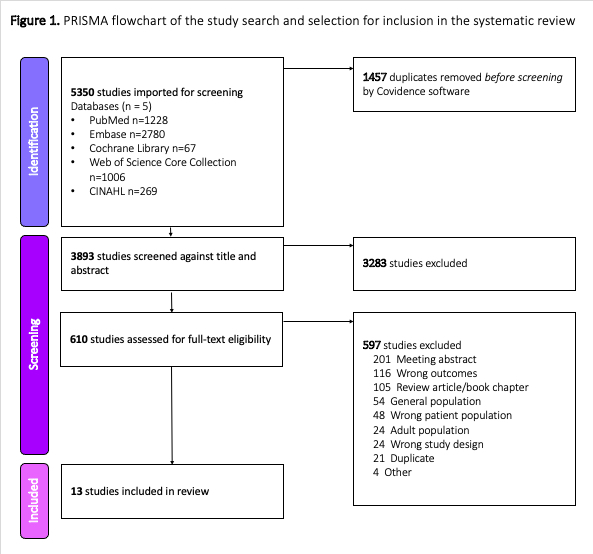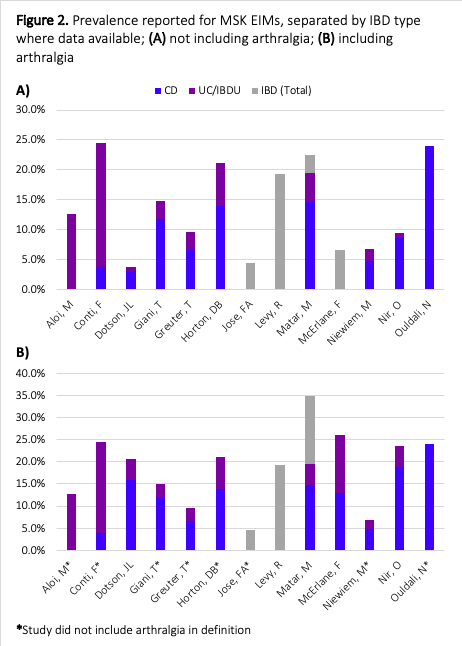Session Information
Date: Tuesday, November 9, 2021
Title: Pediatric Rheumatology – Clinical Poster III: Miscellaneous Rheumatic Disease (1614–1644)
Session Type: Poster Session D
Session Time: 8:30AM-10:30AM
Background/Purpose: Paediatric inflammatory bowel disease (p-IBD) is a chronic and relapsing gastrointestinal disorder of childhood with associated long-term morbidity. Several extraintestinal manifestations (EIMs) are described, the most common being joint pain and/or inflammation. In 1986, Passo et al. were the first to describe the association of arthritis in p-IBD patients. In this retrospective study, arthritis was described in 9% of children with ulcerative colitis (UC) and in 15.5% of children with Crohn’s disease (CD). Arthralgia was more common than arthritis, occurring in 32% of patients with UC and 22% with CD. Data on the epidemiology, patient and disease factors associated with the development of, treatments required for, and outcomes of p-IBD associated musculoskeletal (MSK) disease is lacking. Our study aims to summarize the literature on the epidemiology of MSK EIMs in p-IBD in the era of biologics.
Methods: A systematic review of the literature was performed. PubMed, Embase, Cochrane Library, Web of Science Core Collection, and CINAHL databases were searched with relevant keywords. English studies published from January 1, 2000 to December 21, 2020 were included. In total, 3,893 papers were identified, and screening was performed by two independent reviewers (AA, MS; Figure 1). Conflicts were resolved by a third reviewer (EC or RB). Characteristics of the study such as research design, setting, and sample size, as well as phenotypic characteristics of the population were recorded. The primary outcomes of interest were MSK symptoms at presentation and course, method of diagnosis and definitions used for MSK EIMs. Risk of bias assessment was performed using the JBI Prevalence Study Critical Appraisal Tool.
Results: Thirteen studies were included for full review, which were primarily single-centre observational studies with retrospective or cross-sectional design. The method of diagnosis for MSK EIMs varied greatly across the studies, with only 4 studies stating the involvement of a rheumatologist in the diagnosis. The definitions used also varied, with MSK-related features such as peripheral arthritis, axial arthritis, enthesopathy, myalgia, and arthralgia included. Only 6 studies focused on MSK EIMs as their primary outcome, while the remainder reported on all p-IBD associated EIMs. There was a wide range in the prevalence of MSK EIMs from 3.7-34.8% (Figure 2a, 2b). Four studies reported on the therapeutic response of MSK EIMs to pharmacotherapy, and only 3 of those reported on biologic use. Risk of bias demonstrated heterogeneity in the quality of included studies.
Conclusion: This is the first systematic review of the literature for MSK EIMs in p-IBD. Analysis was limited due to variability in study design and data-reporting methods. Included studies reported prevalence of MSK EIMs, but the ascertainment of MSK EIMs, both method and definition varied with a clear lack in standardization. Our study demonstrates the need for research to capture the presentation, diagnosis, management, and morbidity associated with MSK EIMs in p-IBD.
 PRISMA flowchart for study inclusion
PRISMA flowchart for study inclusion
 MSK EIM reported prevalence rates
MSK EIM reported prevalence rates
To cite this abstract in AMA style:
Ali A, Schmidt M, Piskin D, Crowley E, Berard R. Epidemiology of Musculoskeletal Manifestations in Paediatric Inflammatory Bowel Disease: A Systematic Review [abstract]. Arthritis Rheumatol. 2021; 73 (suppl 9). https://acrabstracts.org/abstract/epidemiology-of-musculoskeletal-manifestations-in-paediatric-inflammatory-bowel-disease-a-systematic-review/. Accessed .« Back to ACR Convergence 2021
ACR Meeting Abstracts - https://acrabstracts.org/abstract/epidemiology-of-musculoskeletal-manifestations-in-paediatric-inflammatory-bowel-disease-a-systematic-review/
